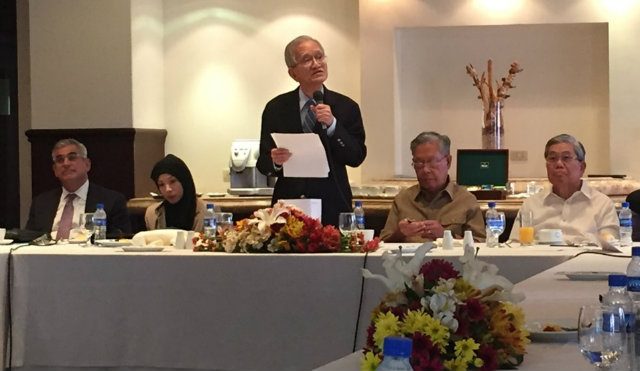SUMMARY
This is AI generated summarization, which may have errors. For context, always refer to the full article.

MANILA, Philippines – The citizens’ council on the proposed Bangsamoro Basic Law (BBL) on Thursday, April 9, announced the names of 17 individuals who will help the group review the measure and forge a consensus.
The new members, who come from various sectors, include:
- Archbishop Socrates Villegas
- Fr Joel Tabora, president of Ateneo de Davao University
- Bishop Pablo David
- Philippine Center for Islam and Democracy president Amina Rasul
- Lawyer Christian Monsod, member of the 1986 Constitutional Commission
- Ateneo de Manila Law School Dean Sedfrey Candelaria
- University of the Philippines College of Law Dean Danilo Concepcion
- Professor Moner Bajunaid
- CODE-NGO chairperson Pat Sarenas
- Lawyer Nasser Marohomsalic
- Former NEDA director-general and professor Cielito Habito
- Businessman John Perrine
- Ambassador Wilfrido Villacorta
- Bishop Efraim Tendero
- Lawyer Marlon Manuel
- Archbishop Antonio Ledesma
- Makati Business Club chairman Ramon del Rosario
They will work alongside the original 5 members: Manila Archbishop Luis Antonio Cardinal Tagle, former Chief Justice Hilario Davide Jr, businessman Jaime Augusto Zobel de Ayala, former Philippine Ambassador to the Holy See and Malta Howard Dee, and founder of Teach Peace, Build Peace Movement Bai Rohaniza Sumndad-Usman.
During their first meeting on Monday, April 6, the group agreed to divide their work and focus on 4 topics based on “controversial” BBL provisions:
- Constitutionality and forms and powers of government (to be led by Davide)
- Justice, including social justice and human development (to be led by Dee and Usman)
- Economy and patrimony (to be led by Ayala)
- Human Security
The convenors are expected to hold discussions in the coming days. They aim to finish and produce an output by April 18 – just in time for the resumption of BBL discussions in the House of Representatives on April 20. The Senate, meanwhile, is set tackle the bill on April 13.
President Benigno Aquino III convened the group in the aftermath of the Mamasapano tragedy that sparked public outrage and eroded support for the BBL. (READ: 62% of Mindanao residents oppose BBL – Pulse Asia)
While the Peace Council was created by the President, the members maintain it is an independent body. In an earlier statement, the group said funding for their activities will be sourced from the private sector and development partners. (READ: ‘Peace council an avenue for dialogue not a presssure group)
The BBL is a key factor in implementing the peace deal between the government and rebel group Moro Islamic Liberation Front (MILF). It aims to entrench an enhanced political entity in Mindanao with greater fiscal and political powers than the current one in place.
But aside from the political fallout over the measure, it also faces questions on constitutionality and inclusiveness, among others. – Rappler.com
Add a comment
How does this make you feel?
There are no comments yet. Add your comment to start the conversation.